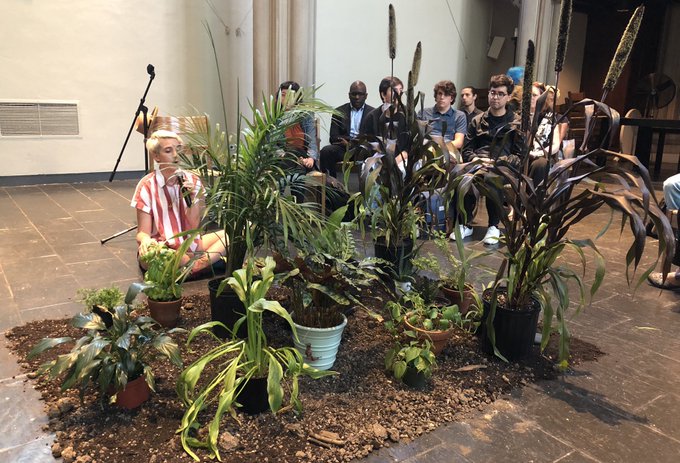
We were rather smug about getting our Christmas tree early this year, our seventh from a Bancroft farm called Switzers which sets up here in Belleville every December. They weathered the economic downturn of a decade ago which put many growers out of business and are doing well. We notice that their urban forest on the corner is diminishing rapidly, which is encouraging.
We realized when we got home that our tree has both a fork into two stems about half way up, and a twist. When we first put it in the stand we couldn't find a spot which didn't look wonky, although now it is splendid, I must say. It was a living, growing creature, and while an actual tree is much more of a delight to the senses and environmentally responsible I always feel a little guilty. Should I apologize to this tree, which is probably ten years old, for taking its life for a few weeks of nostalgia and family pleasure?
Back in September there was a brief media kerfuffle about a chapel service at Union Seminary in the States where there was an apology or confession regarding the treatment of plants which involved bringing in various herbage to make the visual point -- I don't think any conifers were involved. Some of the headlines were scathing and a few Christians huffed and puffed about the "theological bankruptcy" and paganism of this relatively brief service.

Union Seminary "Confession to Plants" Chapel Service
Shortly after the reporting and criticism the prof who organized the event wrote a response in Sojourners magazine. As you'll read, what happened was thoughtful and not goofy at all, even if it was...unusual. Hey, I'm not inspired to gather our family around the tree for an act of contrition on Christmas Day, but I get what the students at Union were up to. When we confess our sins publicly or privately it is a transaction of sorts, which involves God and possibly the person or persons whom we've offended. Why not Creator and creation(s)?
It's worth pondering. And those of you with fake trees are off the confessional hook!
Last week our chapel service was called Temple of Confessions.
As we gathered in the narthex of James Chapel, I gave an introduction that included these words:
Many of us have a disconnected relationship with nature and relate to nature as outside things, as "it." Today we will try to create new connections by talking to the plants, soil, and rocks and confess how we have related with them. Confessions are also forms of mending relations, healing, and changing our ways. We are all manifestations of the sacredness of life and the "we" of God's love is way beyond the human, so let us confess to “each other" including plants, soil, rocks, rivers, forests.
We processed into the chapel carrying plants and placed them on soil. Immediately people started to come to the plants, to confess their forms of relation or non-relation. One student said something that stuck with me: “I don’t know how to relate to you in this subjective way. I am afraid that if I do I might discover a level of pain that I don’t know whether I can bear.”
I think her reaction sums up the beauty of the ritual. By confessing, we are able to perceive something new. We experience what were the objects of nature – animals, plants, trees, forests — as subjects, with their own full life and experience. They become to us what many sacred scriptures have claimed: a full part of creation, just as we are. And for Christians, who are called to confess their sins, they may take seriously what Jesus said: Therefore, if you are offering your gift at the altar and there remember that your brother or sister has something against you,leave your gift there in front of the altar. First go and be reconciled to them; then come and offer your gift. (Matthew 5: 23-24)
Confession is a basic practice in Christian tradition. It involves vulnerability and requires openness. It invites a response of kindness, empathy, support. Our confession at our ritual hoped for what all Christian confession promises: healing and transformation. We looked to a new relationship with the earth, and thus with God. Ritual confession involves pausing, listening, and a new way of being. Confession can run the risk of a naïve and sentimental idealizing of the earth and of nature, but this practice sought something deeper — to expand faith as we recognize the interdependence of life and relinquish the death-dealing habits of our human autonomy in relation to our mastery over the natural world.
No comments:
Post a Comment